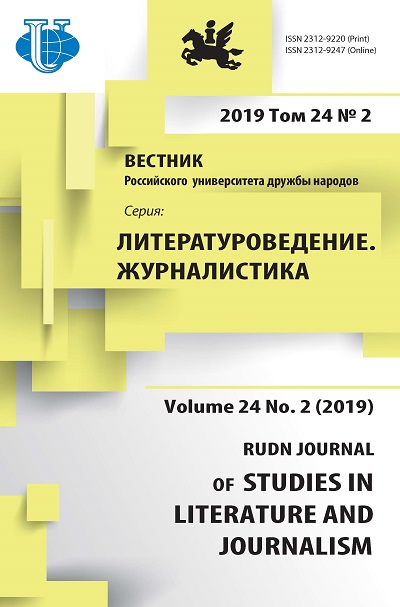The transformation of the image of the house in the diaries of Irina Knorring
- Authors: Koznova N.N.1
-
Affiliations:
- Saint Petersburg State University of Industrial Technologies and Design
- Issue: Vol 24, No 2 (2019)
- Pages: 196-203
- Section: LITERARY CRITICISM
- URL: https://journals.rudn.ru/literary-criticism/article/view/21728
- DOI: https://doi.org/10.22363/2312-9220-2019-24-2-196-203
- ID: 21728
Cite item
Full Text
Abstract
In this article, based on the material of the diaries of the first wave reader Irina Knorring (1906- 1943), which are little-known to the modern reader, a detailed contextual analysis is carried out aimed at identifying various modifications of one of the key images of the story - the image of the house. In the course of the analysis, the semantic expansion of the image becomes obvious: from the ancestral estate to the big city, from it to Russia, as a huge country-home, in space, planetary meaning. The author’s rethinking of the archetypal concept of “home” occurs gradually under the influence of changing socio-political, historical and cultural circumstances in Russia and the world as a whole in the first half of the 20th century. As a result, it becomes clear the particular poet to the diary genre forms, not only in prose, but also in poetry, which, according to contemporaries I. Knorring, “the diary of her female soul”.
About the authors
Natalia N. Koznova
Saint Petersburg State University of Industrial Technologies and Design
Author for correspondence.
Email: nkoznova@mail.ru
SPIN-code: 7867-0682
Doctor of Philology, Professor of Department of Journalism and Media Technologies of Saint-Petersburg State University of Industrial Technologies and Design
18 Bolshaya Morskaya St., Saint Petersburg, 191186, Russian FederationReferences
- Knorring I.N. Povest’ iz sobstvennoi zhizni: dnevnik [The story of her own life: Diary: in 2 vol. Vol. 1]. Moscow: Agraf Publ., 2009. 608 p. (In Russ.)
- Egorov O.G. Dnevniki russkikh pisatelei XIX veka: issledovanie [Diaries of Russian writers of the XIX century: Research]. Moscow: Flinta Publ.; Nauka Publ., 2002. 285 p. (In Russ.)
- Likhachev D.S. Izbrannye raboty: v 3 t. T. 2 [Selected works: in 3 vol. Vol. 2]. Leningrad: Khudozhestvennaya literatura Publ., 1987. 496 p. (In Russ.)
- Radomskaya T.I. Dom i Otechestvo v russkoi klassicheskoi literature pervoi treti XIX veka. Opyt dukhovnogo, semeinogo, gosudarstvennogo ustroeniya [Home and Fatherland in Russian classical literature of the first third of the XIX century. Experience spiritual, family, state dispensation]. Moscow: Sovpadenie, 2006. 240 p. (In Russ.)
- Lotman Yu.M. Semiosfera [Semiosphere]. Saint Petersburg: Iskusstvo-SPb Publ., 2001. 703 p. (In Russ.)
- Lakshin V.Ya. O Dome i Bezdom’e (A. Blok i M. Bulgakov). Literatura v shkole. 1993. No. 3. Pp. 13—17. (In Russ.)
- Dergacheva E.I. Dom i istoriya v romane M. Osorgina “Sivtsev Vrazhek”. Mikhail Osorgin: stranitsy zhizni i tvorchestva: Nauchnaya konferentsiya “Osorginskie chteniya” (23—24 noyabrya 1993). Perm’: Permskii universitet, 1994. Pp. 56—64. (In Russ.)
- Razuvalova A.I. Obraz doma v russkoi proze 1920-kh godov [abstract of dissertation]. Omsk, 2004. 25 p. (In Russ.)
- Lotman Yu.M. Vnutri myslyashchikh mirov. Chelovek — tekst — semiosfera — istoriya [Inside the thinking worlds. Man — text — semiosphere — history]. Moscow: Yazyki russkoi kul’tury Publ., 1996. 464 p. (In Russ.)
- Ginzburg L.Ya. O psikhologicheskoi proze. O literaturnom geroe [About psychological prose. On the literary hero]. Saint Petersburg: Azbuka Publ., Azbuka-Attikus Publ., 2016. 704 p. (In Russ.)
- Knorring I.N. Povest’ iz sobstvennoi zhizni: Dnevnik [The story of his own life: Diary: in 2 vol. Vol. 2]. Moscow: Agraf Publ., 2013. 592 p. (In Russ.)
Supplementary files















